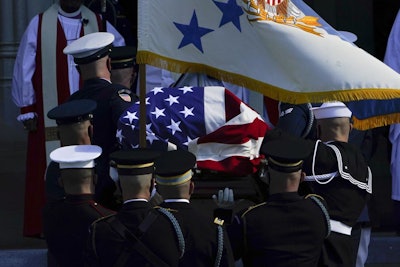Colin L. Powell, the trailblazing soldier-diplomat who rose from humble beginnings to become the first Black secretary of state, was remembered by family and friends Friday as a principled man of humility and grace whose decorated record of leadership can serve as a model for generations to come.
“The example of Colin Powell does not call on us to emulate his resume, which is too formidable for mere mortals,” his son, Michael, said in a touching tribute at his father’s funeral service at Washington National Cathedral. “It is to emulate his character and his example as a human being. We can strive to do that.”
The funeral on a sunny and chilly day drew dignitaries and friends from across the political and military spectrum. They included President Joe Biden and former presidents George W. Bush and Barack Obama, former secretaries of state James Baker, Condoleezza Rice and Hillary Clinton, former Defense Secretary Robert Gates, and the current chairman of the Joint Chiefs, Army Gen. Mark Milley.
Two recent presidents did not attend — Bill Clinton, who is recovering from a severe infection, and Donald Trump, who publicly disparaged Powell after his death for having been critical of the former president.
Powell died Oct. 18 of complications from COVID-19 at age 84. He had been vaccinated against the coronavirus, but his family said his immune system had been compromised by multiple myeloma, a blood cancer for which he had been undergoing treatment.
Funeral attendees Friday were required to wear masks. Not all did. 
As guests gathered in the cavernous cathedral that has hosted the funerals of several past presidents, including Dwight D. Eisenhower, the U.S. Army Brass Quintet played a range of tunes, including “Dancing Queen” by Abba, a favorite of Powell’s.
Richard Armitage, who served as the State Department’s No.-2-ranking official while Powell was secretary of state during the Bush administration, recalled the day Sweden’s foreign minister, Ann Linde, came to call and — knowing of Powell’s affection for Abba — presented him with a full CD set of group’s music.
“Colin immediately went down on one knee and sang the entire ‘Mamma Mia’ to a very amused foreign minister of Sweden and to a gob-smacked U.S. delegation. They’d never seen anything like it,” said Armitage, who described a 40-year friendship with Powell that began while both served in the Pentagon.
Madeleine Albright, who was Powell’s immediate predecessor as secretary of state, called him “a figure who almost transcended time,” and “one of the gentlest and most decent people any of us will ever meet.”
“He relished the opportunity to connect with other generations,” she said.
Two recent presidents did not attend — Bill Clinton, who is recovering from a severe infection, and Donald Trump, who publicly disparaged Powell after his death for having been critical of the former president.
Powell died Oct. 18 of complications from COVID-19 at age 84. He had been vaccinated against the coronavirus, but his family said his immune system had been compromised by multiple myeloma, a blood cancer for which he had been undergoing treatment.
Funeral attendees Friday were required to wear masks. Not all did.
As guests gathered in the cavernous cathedral that has hosted the funerals of several past presidents, including Dwight D. Eisenhower, the U.S. Army Brass Quintet played a range of tunes, including “Dancing Queen” by Abba, a favorite of Powell’s.
Richard Armitage, who served as the State Department’s No.-2-ranking official while Powell was secretary of state during the Bush administration, recalled the day Sweden’s foreign minister, Ann Linde, came to call and — knowing of Powell’s affection for Abba — presented him with a full CD set of group’s music.
“Colin immediately went down on one knee and sang the entire ‘Mamma Mia’ to a very amused foreign minister of Sweden and to a gob-smacked U.S. delegation. They’d never seen anything like it,” said Armitage, who described a 40-year friendship with Powell that began while both served in the Pentagon.
Madeleine Albright, who was Powell’s immediate predecessor as secretary of state, called him “a figure who almost transcended time,” and “one of the gentlest and most decent people any of us will ever meet.”
“He relished the opportunity to connect with other generations,” she said.
“I felt distinctive” in uniform, he wrote.
Although he was only 4 when the United States entered World War II, he had vivid memories of the war years. “I deployed legions of lead soldiers and directed battles on the living room rug,” he wrote — a fantasy forerunner of his Army years.
Powell would serve 35 years in uniform. Commissioned in 1958, he served around the world, including two tours in Vietnam in the 1960s.
He distinguished himself at the Pentagon even before he attained flag officer rank. In the late 1970s he worked in the Office of the Secretary of Defense, and in 1983 as a brigadier general he became the senior military assistant to Defense Secretary Caspar Weinberger. He later served in the White House as President Ronald Reagan’s national security adviser, and in 1989 he was promoted to four-star general. Later that year, President George H.W. Bush selected him to be the first Black chairman of the Joint Chiefs.
It was a trailblazing American dream journey that won him international acclaim and trust.
He put that credibility on the line in February 2003 when, appearing before the United Nations as secretary of state, he made the case for war against Iraq. When it turned out that the intelligence he cited was faulty and the Iraq War became a bloody, chaotic nightmare, Powell’s stellar reputation was damaged.
Still, it wasn’t destroyed. After leaving government, he became an elder statesman on the global stage and the founder of an organization aimed at helping young disadvantaged Americans. Republicans wanted him to run for president. After becoming disillusioned with his party, he ended up endorsing the last three Democratic presidential candidates, who welcomed his support.














